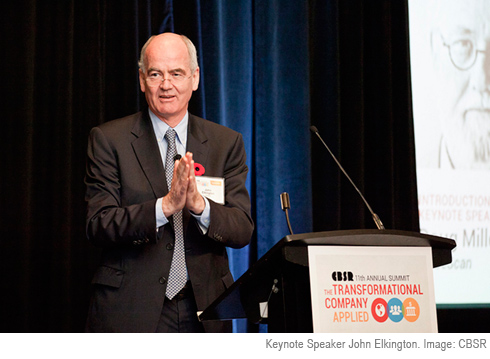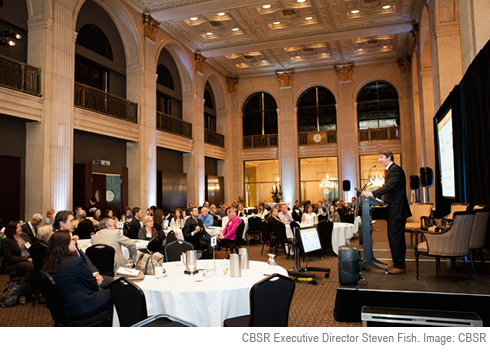 The 11th Annual Summit by Canadian Business for Social Responsibility brought together an international panel of leaders to address how corporate social responsibility practitioners can lead their companies onto a transformational path. Keynote speaker John Elkington showed how enterprises can set and achieve bold goals that touch their core business while addressing systemic societal risks and challenges.
The 11th Annual Summit by Canadian Business for Social Responsibility brought together an international panel of leaders to address how corporate social responsibility practitioners can lead their companies onto a transformational path. Keynote speaker John Elkington showed how enterprises can set and achieve bold goals that touch their core business while addressing systemic societal risks and challenges.
Set bold goals that touch your core business
Named by Bloomberg Businessweek as “a dean of the corporate responsibility movement for three decades”, John Elkington led the keynote address to kick off the 11th edition of the signature CBSR event in Toronto. By now most companies have done “the superfisual things, like going carbon neutral”, says Elkington. It is now time to set and achieve bold goals that touch your core business and transform your company while addressing systemic societal risks and challenges.
Panelists Eric Whan of GlobeScan and Chad Park of The Natural Step both urge companies to align their CSR goals with their core business. When setting goals, think about your core business risks. What are the risks that can take your whole business down? Also think of the risks faced by your suppliers, your clients and customers. Those risks could take them down and indirectly harm your business, too.


To use an example, if you are in the soft drinks business like Coca-Cola, the bulk of your products’ content is water. If water becomes scarce, that would have a great impact on your whole business. Water is a risk that touches Coca-Cola’s core business. Addressing the risk of water scarcity would be a worthy goal to set. Taking action to address the water risk could help strengthen Coca-Cola as a business but also help address this great systemic societal challenge.
Collaborate to reach those goals
Setting bold goals are well and fine, but reaching those goals is much more challenging and require much more resources than going carbon neutral or changing light bulbs. Who has the resources to take on such challenges? No one does. Not even Fortune 500 multinationals. The answer, as the keynote panelists all agree, lies in collaboration.
The era of doing green projects in isolation, as Director of Sustainability of Coca-Cola Canada David Moran recently told me, is over. Coca-Cola collaborate with global partners like WWF and Greenpeace and local partners like the Toronto and Region Conservation Authority on a wide range of environmental projects.
Reach out and collaborate with your industry associations and professional associations, says panelist Coro Strandberg of the non-profit organization CBSR. To achieve your bold goals, form partnerships with NGOs, suppliers, and even your competitors. A global study conducted by MIT Sloan Management Review and the Boston Consulting Group found that global leaders most successful in turning sustainability activities into profits collaborate more than other companies do. A similar study by Leger and OfficeMax Grand & Toy found Canadian companies lag behind global leaders in driving profitability through collaboration. (See Sustainability: Canada’s Strengths and Weaknesses.)
Collaboration is not easy. The keynote panelists recognize that collaboration can be messy and may require skills that are new to the company, noted Summit delegate Josephine Pham. It is important to invest time and efforts in learning collaboration skills. Edgar Blanco, a research director at the MIT Center for Transportation and Logistics, says that although companies may find this process challenging, it is essential: “If you’re going to focus your strategy on carbon reduction or environmental impact or social impact, you need to engage your suppliers. Without them, you cannot succeed.” (See how Walmart, Coca-Cola, and Unilever collaborate in Three CEOs in One Room.)
That set the stage for the Summit sessions, which include “How to Sustain Effective Multi-Stakeholder Collaboration and Partnerships”, “Sustainable Value Chains”, “CSR Reporting: Shifting from Inform to Engage”, and “Public Policy Advocacy to Advance Sustainability”. You can find the individual session summary here.

Thank you for sharing the highlights of Elkington’s speech. I teach a business communications class and I plan to use your post as a reading with classroom discussion to follow.
Glad it’s useful to your class, Terry. It was great to hear John Elkington live.
[…] but helping your stakeholders succeed, which in turn reinforce your own success. (See my article on The Transformational Company on how enterprises can set bold goals that touch their core business while addressing systemic […]